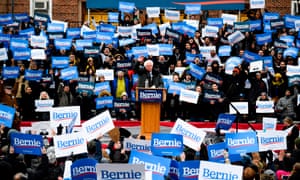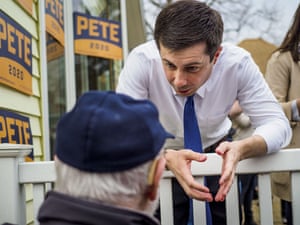Bernie Sanders
Sanders dares Democrats to stop him – but is he the man to beat Trump?
The socialist senator and his supporters seem to have the upper hand over a party establishment worried he’s too leftwing

Photograph: Johannes Eisele/AFP/Getty Images
Raging against the machine has taken Bernie Sanders a long way. In 2016, his disdain for “the establishment” and the “donor class” gave progressives a near-perfect foil to Hillary Clinton, who was cast as the “anointed” Democratic candidate for president.
Sanders was beaten in the primary but the senator and his allies clamored for and won changes to party rules they said were “rigged”. Now, the party’s role in choosing its nominee has been limited and a Sanders nomination is a very real possibility. At the top of early polls, the increasingly confident senator from Vermont is daring the “political establishment” to stop him.
“They are terrified of our movement – as they should be,” campaign manager Faiz Shakir wrote in an email to supporters as part of an “emergency 48-hour fundraising drive” to counter what he called a “serious threat to our campaign”.
The appeal was sent out after a New York Times report revealed a series of private dinners in which Democratic leaders, strategists, donors – and even a presidential candidate, Pete Buttigieg – had met to discuss “the matter of What To Do About Bernie”.
Not long before the Times story came out, Sanders had escalated a feud with the Center for American Progress, a liberal thinktank founded by a Clinton ally. In a sharply worded letter, he accused the group of trying to “smear” him in a video produced by an affiliated website.
Larry Sabato, director of the University of Virginia Center for Politics, said Sanders was “sending a very clear signal to the party that, ‘If you want me to play ball – whether I win or lose the nomination – then don’t intervene in any way in the nomination process’.”
Democrats have worked hard to mend the wounds of 2016 and to forge a united front against Donald Trump. Early in 2017, Sanders joined Democratic National Committee chair Tom Perez on a “unity tour”. He also accepted a Senate Democratic leadership position, an unusual move for a registered independent.
But many Sanders supporters remain deeply suspicious of Democratic institutions and leaders, and in return some Clinton supporters, and indeed the former nominee, secretary of state, senator and first lady herself, believe his attacks caused “lasting damage” in 2016.
After Sanders launched his 2020 White House run, tensions between the camps flared. The senator drew an unusually sharp rebuke from Clinton’s spokesperson when he said he had no interest in seeking advice from the former nominee, citing “fundamental differences”. The dust-up followed a Politico story in which loyalists traded insults.

“An internal civil war helps only one person and that’s Donald Trump,” said California congressman Ro Khanna, a co-chair of the Sanders 2020 campaign. “We need to avoid that at all costs.”
Khanna argued that a concerted effort to “stop Sanders” would be futile because it is the senator’s progressive policies – and his long record of advocacy for such issues – that has cemented his early frontrunner status in a crowded field. He pointed to other candidates who have embraced Sanders’ populist progressive positions.
In 2018, the Democrats path to the majority ran through dozens of districts that voted for Trump two years prior. Moderates believe Sanders, who only became a Democrat to run for the nomination, would alienate these voters in the general election. Worse, they fear he might draw in a third-party “spoiler”. Former Starbucks chief executive Howard Schultz is considering a run as a “centrist independent” and has blamed Sanders for moving the party too far left.
There is little evidence that a concerted effort to stop Sanders would have any impact, not least because he thrives under real or perceived attack by the party establishment. Some of Sanders’ best fundraising days in 2016 came when Clinton stepped up her criticism.
Rick Wilson, a Republican political consultant and author of Everything Trump Touches Dies, said he understood the impulse to stop Sanders.
“If I were the Trump team I would wake up every morning begging for [the nominee] to be Bernie Sanders,” Wilson said. “‘Crazy old socialist’ is a note [Trump] knows how to play.”
A mainstream Democrat, such as Joe Biden or even rising star Buttigieg, could attract disaffected Republicans like himself, Wilson said.
“This is not about Medicare for All or free college or any of that,” he said. “This is about Donald Trump. Democrats have two choices: make this a referendum on Donald Trump or lose. That’s it. There are no other options.”
But Sanders is betting that his anti-establishment appeal is a perfect match for Trump in the heartland states the president needs to win in 2020. To make the case, Sanders held a town hall with Fox News and surprised perhaps even himself when the network’s audience whooped and cheered his polices.
There is little evidence a campaign against Sanders would work. After all, the last time a party’s leaders joined forces to thwart a surging populist frontrunner, they failed spectacularly.
“The Republicans are the more controllable party,” Sabato said. “They fall in line. And yet their leadership completely failed to stop a reality TV star from becoming the party’s nominee.”
For Sanders’ most loyal supporters, the Times report was only further proof that despite hard-won changes to party rules and the leftward ideological tilt of the presidential field, the deck is still stacked against their man. They are in a determined mood.
“This has been a galvanizing moment for Bernie’s supporters,” said RoseAnn DeMoro, a former president of National Nurses United. She warned: “You alienate millions of people when you alienate Bernie Sanders.”
Former Obama adviser Dan Pfeiffer, meanwhile, was blunt about what those who do not want a Sanders candidacy must do.
“If you want to have an impact on who the nominee is,” he said on Twitter, “go to Iowa and knock on some fucking doors. Don’t go to a dinner in Manhattan and tell the New York Times about it.”
Source: Elections - theguardian.com




